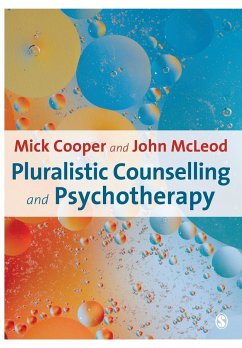Mick Cooper and John McLeod pioneer a major new framework for counselling theory, practice and research - the 'pluralistic' approach. This model breaks away from the orientation-specific way in which counselling has traditionally been taught, reflecting and responding to shifts in counselling and psychotherapy training.
As accessible and engaging as ever, Cooper and McLeod argue that there is no one right way of doing therapy and that different clients need different things at different times. By identifying and demonstrating the application of a range of therapeutic methods, the book outlines a flexible framework for practice within which appropriate methods can be selected depending on the client's individual needs and the therapist's knowledge and experience.
This is a must-read for anybody training or practising in the counselling or helping professions - it should not be missed!
As accessible and engaging as ever, Cooper and McLeod argue that there is no one right way of doing therapy and that different clients need different things at different times. By identifying and demonstrating the application of a range of therapeutic methods, the book outlines a flexible framework for practice within which appropriate methods can be selected depending on the client's individual needs and the therapist's knowledge and experience.
This is a must-read for anybody training or practising in the counselling or helping professions - it should not be missed!
"The writing style is plain and clear. The structure of each chapter is evident, rather like a textbook with handy bullet points at the beginning indicating the chapter's content, a summary at the end, and questions and exercises to test the reader's critical understanding. There is recommended reading so that you can follow up on particular points, and no particularly difficult or obscure language to grapple with. I found the text totally accessible.
The authors call for service-providers to think carefully about the risks involved in only offering a limited range of therapeutic modalities / brands such as CBT, psychodynamic, person-centred, existentialism, and so forth, that is, to consider the risks of not providing the therapy that would be optimal for the client and the society around him" -Paula Smith, Journal of The Society for Existential Analysis
"Mick Cooper and John McLeod have produced a truly groundbreaking book in the field of counselling and psychotherapy which immediately ranks as one of the most significant in terms of influencing my own thinking and practice. The pluralistic approach is likely to resonate with many who have struggled to make sense of multiple approaches and practices which all seem potentially helpful, and the positioning of the collaborative relationship with the client at the centre of the approach fits very well with current thinking in mental health more widely. The book brings together a wealth of relevant theory and research, with illuminating examples. It is a valuable counter to the overly precious 'us and them' type thinking that can be so prevalent in the counselling and psychotherapy world, and gives us new and helpful ways of speaking our experiences of therapy." - Meg Barker, Open University, co-author of Understanding Counselling and Psychotherapy, 2010, SAGE
"This book comes at an opportune moment for practitioner training and practice. It will be an invaluable source text for trainees and experienced practitioners seeking support in developing their understanding of, and practice in, contemporary counselling and therapy." - Dr Lynne Gabriel, Reader in Counselling and Relational Ethics and Chair, BACP
"Fifteen years of research amongst therapy users has shown me that most of them know and care little what therapy modality they receive. They want a therapy that works, that helps them meet their own goals, and that treats them respectfully and responsively as customers of a service. This book describes an approach which is groundbreaking in meeting these criteria. It is packed with interesting ideas and research, beautifully written and gripping to read." - Nicky Forsythe, Mental Health Services Researcher
The authors call for service-providers to think carefully about the risks involved in only offering a limited range of therapeutic modalities / brands such as CBT, psychodynamic, person-centred, existentialism, and so forth, that is, to consider the risks of not providing the therapy that would be optimal for the client and the society around him" -Paula Smith, Journal of The Society for Existential Analysis
"Mick Cooper and John McLeod have produced a truly groundbreaking book in the field of counselling and psychotherapy which immediately ranks as one of the most significant in terms of influencing my own thinking and practice. The pluralistic approach is likely to resonate with many who have struggled to make sense of multiple approaches and practices which all seem potentially helpful, and the positioning of the collaborative relationship with the client at the centre of the approach fits very well with current thinking in mental health more widely. The book brings together a wealth of relevant theory and research, with illuminating examples. It is a valuable counter to the overly precious 'us and them' type thinking that can be so prevalent in the counselling and psychotherapy world, and gives us new and helpful ways of speaking our experiences of therapy." - Meg Barker, Open University, co-author of Understanding Counselling and Psychotherapy, 2010, SAGE
"This book comes at an opportune moment for practitioner training and practice. It will be an invaluable source text for trainees and experienced practitioners seeking support in developing their understanding of, and practice in, contemporary counselling and therapy." - Dr Lynne Gabriel, Reader in Counselling and Relational Ethics and Chair, BACP
"Fifteen years of research amongst therapy users has shown me that most of them know and care little what therapy modality they receive. They want a therapy that works, that helps them meet their own goals, and that treats them respectfully and responsively as customers of a service. This book describes an approach which is groundbreaking in meeting these criteria. It is packed with interesting ideas and research, beautifully written and gripping to read." - Nicky Forsythe, Mental Health Services Researcher

